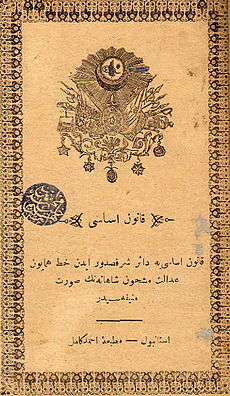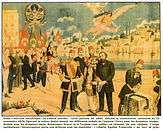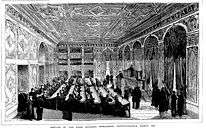First Constitutional Era
Part of a series on the |
|---|
| History of the Ottoman Empire |
 |
|
|
|
|
|
|
|
| Historiography |
The First Constitutional Era (Ottoman Turkish: مشروطيت; Turkish: Birinci Meşrutiyet) of the Ottoman Empire was the period of constitutional monarchy from the promulgation of the Kanûn-ı Esâsî (meaning "Basic Law" or "Fundamental Law" in Ottoman Turkish), written by members of the Young Ottomans, on 23 November 1876 until 13 February 1878. The era ended with the suspension of the Ottoman parliament and the constitution by sultan Abdülhamid II, with which he restored his own absolute monarchy.
The first constitutional era did not include any party system. At the time, the Ottoman parliament (known as the General Assembly of the Ottoman Empire) was seen as the voice of the people but not as a venue for the formation of political parties and organizations.
The elections for parliament were held in accordance with the provisional electoral regulations. The parliament (General Assembly of the Ottoman Empire; Ottoman Turkish: Meclis-i Umumi) was composed in two stages. The lower house of the bicameral legislature was the Chamber of Deputies (Ottoman Turkish: Meclis-i Mebusan), while the upper house was the Senate (Ottoman Turkish: Heyet-i Ayan). The initial selection of deputies was made by administrative councils in the provinces (also called "Meclis-i Umumi").
After the establishment of the General Assembly in the provinces, the members selected the deputies from within the assembly to form the Chamber of Deputies in the capital. The Chamber had 115 members and reflected the distribution of the millets in the empire. In the second elections, there were 69 Muslim millet representatives and 46 representatives of other millets (Jews, Phanariotes, Armenians).
The second body was the Senate, and the members were selected by the sultan. The Senate had only 26 members. It was designed to replace the porte, and the Grand Vizier become the speaker of Senate.
The two elections happened between 1877 and 1878.
First term, 1877
The members' reactions to the approaching war were very strong, and sultan Abdülhamid II asked for new elections citing the Russo-Turkish War (1877–1878).
Second term, 1878
The life of the second term of the parliament was merely a few days, as after the initial speeches by the members from Balkan vilayets, Abdülhamid II closed the parliament, citing social unrest.
Significant people
See also
- Constitutional history of Turkey
- Elections in the Ottoman Empire
- The Ottomans: Europe's Muslim Emperors
- Second Constitutional Era


-Opening_of_the_first_parlement.png)

_p259_Sultan_Abdul_Hamid_II.jpg)